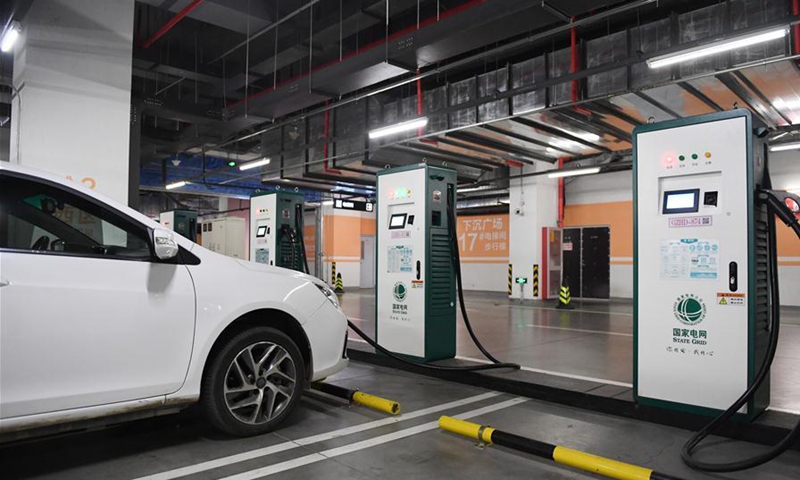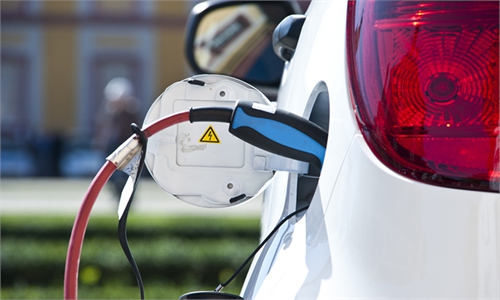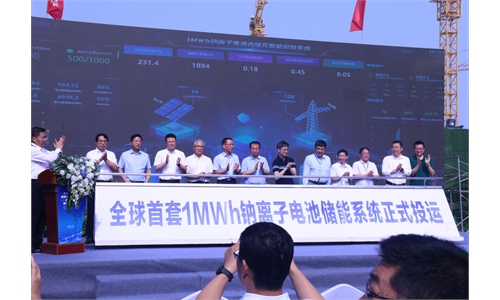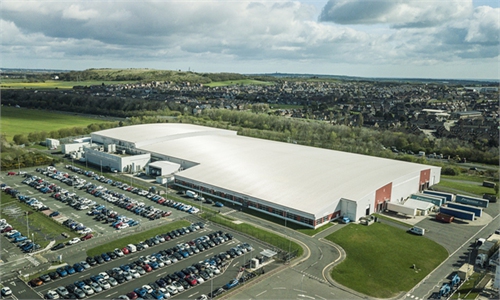Prices of lithium electricity upstream materials rise significantly in China amid EV boom

An electric vehicle is connected to one of the charging points at a newly-opened electric vehicle charging station in the underground parking lot of the Wukesong sports center in Beijing, capital of China, May 16, 2020. Photo: Xinhua
The prices of upstream lithium materials for batteries have continued to rise, boosted by the sales of new-energy vehicles (NEVs) and electric vehicles (EV) in China.
According to industry data, the average price of domestic lithium iron phosphate electrolyte was 84,000 yuan ($12,964) per ton on Friday, 1,000 yuan higher than Thursday's price. And the price of lithium hexafluorophosphate went from 26,000 to 330,000 yuan per ton on Thursday from a day ago.
Lithium hexafluorophosphate is an important upstream raw material for electrolyte, a mid-stream material of lithium batteries.
"Raw material price rises will result in higher battery costs. However, there is little room for EV costs to rise, and the price should remain unchanged," Zhang Xiang, an auto industry analyst, told the Global Times on Friday.
EVs in China are mainly powered by lithium batteries, whose service life is about six to eight years, according to industry practitioners.
By the end of 2020, the domestic production capacity of lithium hexafluorophosphate will be 56,500 tons per year. Everbright Securities predicted that the required lithium hexafluorophosphate in the power battery field will be about 15,000 tons in 2021 and about 54,400 tons in 2025, with an average annual growth rate of about 40 percent, bringing broad market prospects.
Due to the high industry entry threshold, with no new effective capacity of lithium hexafluorophosphate added in the first half of this year, it will be difficult to achieve effective capacity expansion in 2021, which will continue to push up the cost of lithium batteries, according to observers.
The cost of lithium battery accounts for 30-40 percent of EVs' total costs. The cost of a complete vehicle is about 50 percent of the selling price, said Zhang.
China had 5.51 million EVs as of March 2021, and the sales volume in the first five months this year totaled 950,000 units, up 220 percent on a yearly basis, according to statistics from the China Passenger Car Association.
Industry observers estimated that the market size will exceed 100 billion yuan ($15.5 billion) by 2025.
"Such a large market has created economy of scale. As a result, prices of components other than batteries should continue to fall. At the same time, because of the fierce competition in China's EV market, manufacturers will not easily raise prices and lose their edge," Zhang noted.
The development trend of NEVs in the market is considerable, and the penetration rate of EVs is expected to reach 70 percent in the next decade in China. But behind the booming development of EVs, there is a huge hidden problem - the raw materials of batteries.
Cobalt is the core material of ternary lithium battery - a traditionally widely used type of battery in EVs around the world.
According to statistics, the world has a severe shortage of cobalt reserves - currently only about 7 million tons. Among them, China's cobalt reserves only account for 1 percent of the world's reserves at about 80,000 tons.
An employee at a BYD battery plant, who declined to be named, told the Global Times on Friday that the company has developed new types of lithium battery without using cobalt, such as lithium iron phosphate battery.
The proportion of China's EVs carrying lithium iron phosphate batteries rose to 50 percent in 2020, and is still increasing, according to industry statistics.
Due to its advantages of safety and low costs, lithium iron phosphate batteries are widely used in passenger cars, buses, logistics vehicles, low-speed EVs and other kinds of EVs.
Although ternary lithium batteries currently have a dominant position in China, the lithium iron phosphate battery still has irreplaceable advantages in the field of passenger cars and logistics vehicles, said the employee.



